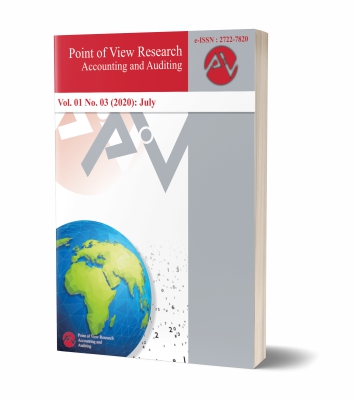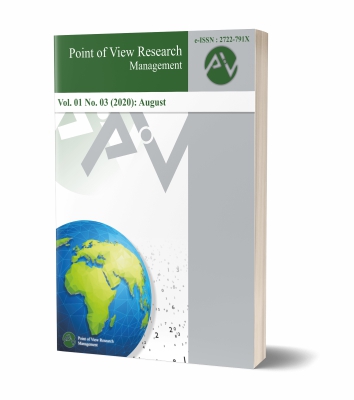Analysis of Zakat Accounting Treatment at PT. Bank BNI Syariah Tulungagung Branch, East Java
Abstract
This study aims to reveal the accounting treatment of corporate zakat on the research subject of PT. Bank BNI Syariah Tulungagung Branch, East Java Province. The study approach uses a descriptive quantitative method. The study results show this report reflects the organization's performance, especially the ability to attract funds and distribute according to targets. The goal of zakat has been achieved so far; understanding human resources at PT. Bank BNI Syariah regarding the implementation of PSAK No. 109 has been completed and is per the procedures applied in PSAK No. Therefore, the bookkeeping uses a simple recording system, namely a single entry, which is considered easier to understand and has fully used financial reporting standards following PSAK 109.
Downloads
References
Adnan, M. A., & Bakar, N. B. A. (2009). Accounting treatment for corporate zakat: a critical review. International Journal of Islamic and Middle Eastern Finance and Management.
Alam, M. K., Mustafa, H., Uddin, M. S., Islam, M. J., Mohua, M. J., & Hassan, M. F. (2020). Problems of Shariah Governance Framework and Different Bodies: An Empirical Investigation of Islamic Banks in Bangladesh. The Journal of Asian Finance, Economics and Business, 7(3), 265–276.
Alchudri, A. (2010). Akuntansi Syariah: Tinjauan Kritis Penyajian Zakat (UU No. 38/1999) dalam Pajak Penghasilan Orang Pribadi (UU No. 17/2000). Jurnal Akuntansi & Manajemen, 5(1), 33–44.
Alim, M. N. (2015). Utilization and accounting of Zakat for productive purposes in Indonesia: A review. Procedia-Social and Behavioral Sciences, 211, 232–236.
Alpay, S., Özdemir, I., & Demirbaş, D. (2013). Environment and Islam. Journal of Economic Cooperation and Development.
Amin, H., Rahman, A. R. A., Sondoh Jr, S. L., & Hwa, A. M. C. (2011). Journal of Islamic Accounting and Business Research.
Andiola, L. M., Bedard, J. C., & Westermann, K. D. (2019). It’s Not my Fault! Insights into Subordinate Auditors’ Attributions and Emotions Following Audit Review. Auditing: A Journal of Practice & Theory, 38(1), 1–27.
Anshori, A. G. (2018). Perbankan syariah di Indonesia. UGM PRESS.
Arfah, A., Olilingo, F. Z., Syaifuddin, S., Dahliah, D., Nurmiati, N., & Putra, A. H. P. K. (2020). Economics During Global Recession: Sharia-Economics as a Post COVID-19 Agenda. The Journal of Asian Finance, Economics and Business, 7(11), 1077–1085.
Aziz, M., & Sholikah, S. (2014). Zakat Profesi Dalam Perspektif UU RI Nomor 23 Tahun 2011 Dan Hukum Islam. ULUL ALBAB Jurnal Studi Islam, 15(2), 188–205.
Bakar, N. B. A., & Barizah, N. (2007). A zakat accounting standard (ZAS) for Malaysian companies. American Journal of Islamic Social Sciences, 24(4), 74.
Chamidah, N., Putra, A. H. P. K., Mansur, D. M., & Guntoro, B. (2020). Penta helix Element Synergy as an Effort to Develop Tourism Villages in Indonesia. Jurnal Manajemen BisniS, 8(1), 1–22.
Damayanti, Y. (2020). Pengaruh Zakat Dan Islamic Corporate Social Responsibility Terhadap Kinerja Bank Umum Syariah (Studi Pada Perbankan Syariah Yang Terdaftar di Bank Umum Syariah Periode 2014-2018). UIN Raden Intan Lampung.
Dewi, D. R., & PRASETIONO, P. (2011). Faktor-faktor yang mempengaruhi profitabilitas Bank Syariah di Indonesia. Universitas Diponegoro.
Farouk, A. U., Md Idris, K., & Saad, R. A. J. Bin. (2018). Moderating role of religiosity on Zakat compliance behavior in Nigeria. International Journal of Islamic and Middle Eastern Finance and Management, 11(3), 357–373. https://doi.org/10.1108/IMEFM-05-2017-0122
Hamat, Z. (2009). Business zakat accounting and taxation in Malaysia. Conference on Islamic Perspectives on Management and Finance, 322.
Ibrahim, S. H. M., & Yaya, R. (2005). The Emerging Issues On The Objectives and The Characteristics Of Islamic Accounting For Islamic Business Organizations. Management & Accounting Review (MAR), 4(1), 74–92.
Kamla, R. (2009). Critical insights into contemporary Islamic accounting. Critical Perspectives on Accounting, 20(8), 921–932.
Khan, M. A. (1987). Methodology of Islamic economics. International Journal of Economics, Management and Accounting, 1(1).
Komala, A. R. (2012). The influence of the accounting managers’ knowledge and the top managements’ support on the accounting information system and its impact on the quality of accounting information: A case of Zakat Institutions in Bandung. Journal of Global Management, 4(1), 53–73.
Mulawarman, A. D., & Kamayanti, A. (2018). Towards Islamic Accounting Anthropology. Journal of Islamic Accounting and Business Research.
Napier, C. (2009). Defining Islamic accounting: current issues, past roots. Accounting History, 14(1–2), 121–144.
Nasir, S. M., & Sululing, S. (2015). Penerapan Akuntansi Murabahah Terhadap Pembiayaan Kredit Pemilikan Rumah Pada Bank Syariah Mandiri Cabang Luwuk. Jurnal Akuntansi, 19(1), 109–128.
Pramuka, B. A. (1998). Accounting in Indonesia: a study of the ideological influences on Western and Islamic accounting thought and practices. University of Hull.
Presley, J. R., & Sessions, J. G. (1994). Islamic economics: the emergence of a new paradigm. The Economic Journal, 104(424), 584–596.
Rahman, T. (2015). Akuntansi Zakat, Infak dan Sedekah (PSAK 109): Upaya Peningkatan Transparansi dan Akuntabilitas Organisasi Pengelola Zakat (OPZ). Muqtasid: Jurnal Ekonomi Dan Perbankan Syariah, 6(1), 141–164.
Rosyidah, T. A. (2012). Implementasi Undang-Undang Nomor 23 Tahun 2011 Terhadap Legalitas Pengelolaan Zakat Oleh Lembaga Amil Zakat (Studi Pada Beberapa LAZ Di Kota Malang). Jurnal Ilmiah Mahasiswa FEB, 1(1).
Saad, R. A. J., Abdul Aziz, N. M., & Sawandi, N. (2014). Islamic accountability framework in the zakat funds management. Procedia-Social and Behavioral Sciences, 164, 508–515.
Said, H. A. (2014). Jalan panjang legislasi syariat zakat di Indonesia: Studi terhadap Undang-Undang Nomor 23 Tahun 2011 tentang pengelolaan zakat.
Sarea, A. M., & Hanefah, M. M. (2013). The need of accounting standards for Islamic financial institutions: evidence from AAOIFI. Journal of Islamic Accounting and Business Research.
Sicilia, I. (2012). Studi Penerapan Akuntansi Zakat Pada Badan Amil Zakat (BAZ) Kota Pekanbaru. Universitas Islam Negeri Sultan Syarif Kasim Riau.
Suandi, A. B. (2013). Islamic accounting in Indonesia: A review from current global situation. Islamic Accounting In Indonesia, 241–264.
Suhartono, D. A., Zahroh ZA, Z. Z. A., & Azizah, D. F. (2017). Analisis Tingkat Kesehatan Bank Dengan Menggunakan Metode Risk Based Bank Rating (Studi Pada Bank Milik Pemerintah Pusat Yang Terdaftar Di Bursa Efek Indonesia Tahun 2012-2015). Jurnal Administrasi Bisnis, 46(1), 131–139.
Tangngisalu, J., Mappamiring, M., Andayani, W., Yusuf, M., & Putra, A. H. P. K. (2020). CSR and Firm Reputation from Employee Perspective. The Journal of Asian Finance, Economics and Business (JAFEB), 7(10), 171-182.
Velayutham, S. (2014). “Conventional” accounting vs “Islamic” accounting: the debate revisited. Journal of Islamic Accounting and Business Research.
Zakir Hossain, M. (2009). Why is interest prohibited in Islam? A statistical justification. Humanomics. https://doi.org/10.1108/08288660910997610
Zaman, R., Roudaki, J., & Nadeem, M. (2018). Religiosity and corporate social responsibility practices: evidence from an emerging economy. Social Responsibility Journal, 14(2), 368–395. https://doi.org/10.1108/SRJ-10-2017-0204
Copyright (c) 2020 Tiwuk Puji Hariyanti

This work is licensed under a Creative Commons Attribution 4.0 International License.






.png)









